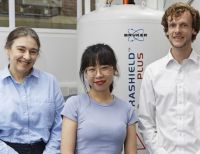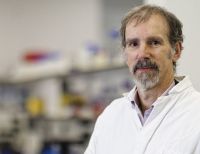In the early days of the COVID-19 pandemic, Roland Sinker, chief executive of Cambridge University Hospitals NHS Foundation Trust (CUH), took a phone call from Professor Andy Neely, Pro-Vice-Chancellor for Business & Enterprise at the University of Cambridge.
"‘Right,’ said Andy, ‘you need personal protective equipment. I've asked today that the University provides all that it possibly can to your staff’," recalls Sinker. "It was a very moving and generous moment."
Two weekends later, he received another call from Neely, proposing that the University, the hospitals and AstraZeneca – which had recently moved its global R&D centre to Cambridge – work together on COVID testing.
Inside the Cambridge COVID-19 Testing Centre
Inside the Cambridge COVID-19 Testing Centre
"We managed to put together in almost no time at all a testing lab that really was a national leader," says Professor Maxwell, who leads the University’s School of Clinical Medicine. "By the time it closed, the Cambridge COVID-19 Testing Centre had processed more than three million tests."
None of this would have been possible were it not for the strength of the relationship between the University and its NHS partners. To get a feel for how close this relationship is you only need to visit the Executive Suite on the second floor of Addenbrooke’s Hospital. There, almost side-by-side are Maxwell and Sinker’s offices.
"One of the things that attracted me to Cambridge was the strength and quality of our relationship with the NHS," says Maxwell. "I think it’s extraordinary."
He says he cannot think of another example where the lead for health in a university and an NHS chief executive have offices adjacent to each other and where the university’s lead is embedded in the NHS management offices. "It says an enormous amount about the commitment on both sides."
Patrick Maxwell, Regius Professor of Physic
Patrick Maxwell, Regius Professor of Physic
Although the post occupied by Maxwell – Regius Professor of Physic – dates back to 1540, when it was endowed by Henry VIII, the Clinical School itself has a much more recent history. It was established in 1976 next door to Addenbrooke’s Hospital, construction of which had been completed at its current location four years previously. CUH was established in 2004, incorporating Addenbrooke’s and – when it opened in 2013 – the Rosie, a maternity hospital.
Since then, the University has built very strong relationships with two other local NHS trusts. Royal Papworth Hospital NHS Foundation Trust – one of the world's leading cardiothoracic hospitals and the UK's main heart and lung transplant centre – moved to the site in 2019, and together with the University opened the Victor Phillip Dahdaleh Heart and Lung Research Institute last year. And a collaboration with Cambridgeshire and Peterborough NHS Foundation Trust will hopefully see the construction of the Cambridge Children’s Hospital, the first in the UK to integrate mental and physical healthcare, alongside research. (The Children’s Hospital – currently at the advanced planning stage – is one of two new hospitals planned for the campus, the second being a collaboration with CUH to build the Cambridge Cancer Research Hospital.)
"The University has gone from almost nothing in clinical medicine in 1976 to one of the top three to five in the world. And that is because of the relationship with the NHS."
Professor Patrick Maxwell
The Clinical School now has almost 3,000 staff. It has researchers across a wide spectrum of disciplines, around 380 of whom also hold posts in one of the local NHS trusts. And around 300 students a year receive their medical training at the Clinical School, with placements across the NHS.
Dr Kristin-Anne Rutter
Dr Kristin-Anne Rutter
Dr Kristin-Anne Rutter is Executive Director of Cambridge University Health Partners, which exists to enable collaborations between the academia (the University of Cambridge and, since 2022, Anglia Ruskin University), the three NHS trusts and industry partners. She describes the relationship between the University and the NHS as "porous", engendering a real spirit of openness between the two institutions.
"They are individual institutions, but they feel like one when they’re collaborating to improve patient care."
Dr Kristin-Anne Rutter
Sinker, who has led CUH since 2015, has worked in several parts of the NHS, with different university partners. He describes the current relationship in Cambridge as "far ahead in terms of the sense of collective endeavour for our patients, and also for how we can transform the way that we look after people globally. It’s a different order of magnitude, and the benefits run both ways."
Roland Sinker (Credit: CUH)
Roland Sinker (Credit: CUH)
But while the Clinical School is the most obvious bedfellow to the NHS, the hospitals also benefit from a wealth of world-leading expertise across the University’s many disciplines, says Rutter, "whether that's operational skills or legal, ethical governance skills".
"It allows us to think really broadly and with great imagination as to what the future might look like."
Roland Sinker
One of Maxwell’s priorities when he took the post of Regius Professor was "to build outwards from our amazing core strengths in discovery science, to increase what we do in terms of translation and entrepreneurship".
The University and hospitals form a key part of the Cambridge Biomedical Campus, where they sit alongside the MRC Laboratory for Molecular Biology (whose researchers have been awarded 12 Nobel Prizes), AstraZeneca's Discovery Centre, GSK’s clinical trials unit, and biotech company – and Cambridge startup Abcam. BioNTech, too, will shortly be opening new labs on the campus.
Cambridge Biomedical Campus
Cambridge Biomedical Campus
In August 2022, a report found that the Campus contributed £2.2 billion annually to the UK economy, supporting 15,000 roles through the regional supply chain (in addition to over 17,500 roles on the Campus itself). There are more than 440 life sciences and healthcare companies in the wider Cambridge life sciences ecosystem.
"The ecosystem around here is incredible," Maxwell says. It is what makes Cambridge one of the world’s leading sites for innovation, helping speed up the translation of research into practice.
"Innovation is going to be critical to the future success of the NHS,” says Rutter. It is what will help it move from a model based on treating illness towards one of disease prevention, early diagnosis and integrated medicine.
And that, says Sinker, "is where the university comes in. I see people thinking really hard about what we do to keep people well, what are we doing to find people quickly when they're poorly, and then how do we bring the very best of our skills to bear on the mechanisms of disease."
This is why, he adds, working in Cambridge, across the NHS and with the University and their industry partners, is "such an extraordinary privilege".














